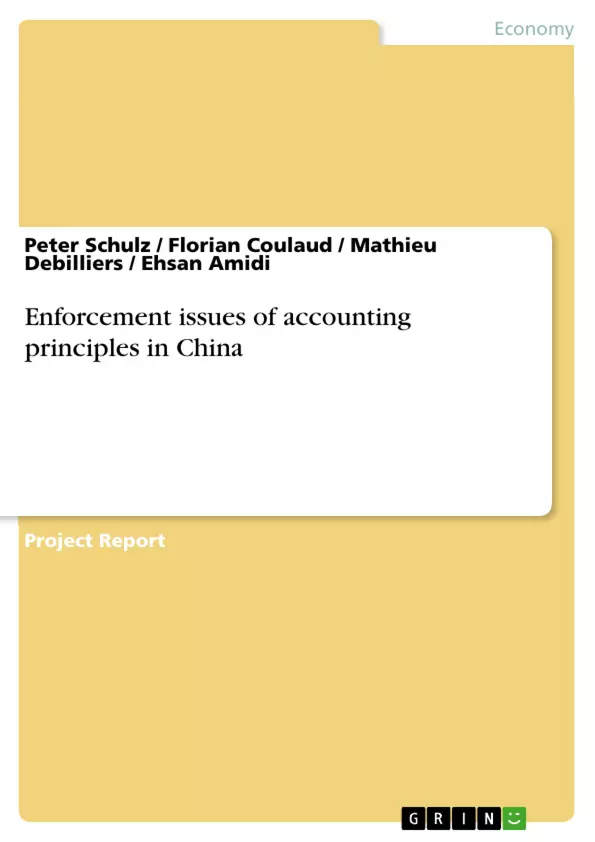In the 21st century, globalisation is deemed inevitable in the development of the world economy. As commercial language, accounting information is internationally accepted so that control over accounting issues and the prevention of accounting fraud are critical to economic development (China Accounting Standards Committee, 2007). In this context, financial reporting quality is regarded as an endogenous function of market demands and political influences that are specific to each country (Chen & Cheng, 2007). The participation of Chinese companies in the world economy has grown during recent decades at a pace that surpasses all other economies significantly. Nevertheless, areas such as accounting and auditing remain a concern. China fully understands that a sound financial reporting system plays a
key role in the process of economic development (Financial Reporting in Mainland China, 2007). In saying so, it is important to mention that it is not the standards itself that seem problematic but rather the enforcement of standards.
Based on a report written in 2003, this analysis will present aspects that can be a concern with regard to enforcement of accounting standards. After describing each point, an update to what extent it has been resolved will be given. Finally, this report will highlight new enforcement issues that have arisen since 2003 before concluding with an outlook concerning China’s future in the field of accounting.
Inhaltsverzeichnis (Table of Contents)
- Introduction
- Factors influencing enforcement of accounting standards
- Regulatory bodies and legal framework
- Professional independence and dominance of state-owned enterprises
Zielsetzung und Themenschwerpunkte (Objectives and Key Themes)
This analysis aims to evaluate the effectiveness of accounting standard enforcement in China since 2003, focusing on factors highlighted by Opper's 2003 report. It will assess the extent to which enforcement problems have been resolved and identify any new issues that have emerged.
- Effectiveness of regulatory bodies and legal framework in China
- Impact of professional independence on accounting standard enforcement
- Role of state-owned enterprises in accounting practices
- Influence of personal networks on accounting decisions
- Impact of international accounting standards on China's accounting landscape
Zusammenfassung der Kapitel (Chapter Summaries)
- Introduction: This chapter provides an overview of the globalized economic context and the significance of accounting standards in China's economic development. It emphasizes the need for sound financial reporting and the challenges associated with enforcing accounting standards in China.
- Factors influencing enforcement of accounting standards: This chapter examines the weaknesses in accounting and auditing standards enforcement in China, as identified by Opper in 2003. It focuses on the roles of regulatory bodies, the legal framework, professional independence, and the dominance of state-owned enterprises.
- Regulatory bodies and legal framework: This section discusses the limitations of the regulatory bodies, such as the Ministry of Finance (MoF) and the Chinese Institute of Certified Public Accountants (CICPA), in enforcing accounting standards. It highlights issues like lack of independence, financial constraints, and inadequate legal sanctions.
- Professional independence and dominance of state-owned enterprises: This section explores the challenges posed by the lack of professional independence, influenced by close ties between regulatory institutions and companies, particularly state-owned enterprises (SOEs). It examines the role of personal networks and the impact of SOE dominance on accounting practices.
Schlüsselwörter (Keywords)
This report focuses on key concepts such as accounting standard enforcement, financial reporting quality, professional independence, state-owned enterprises, regulatory bodies, legal framework, personal networks, and international accounting standards. It also examines the impact of these factors on China's accounting landscape and economic development.
Frequently Asked Questions
What is the main challenge for accounting in China?
The main issue is not the lack of standards, but rather the effective enforcement of these standards in a complex political and economic environment.
How do State-Owned Enterprises (SOEs) influence accounting?
The dominance of SOEs and their close ties to regulatory bodies can compromise professional independence and lead to political influence on financial reporting.
What are MoF and CICPA?
The Ministry of Finance (MoF) and the Chinese Institute of Certified Public Accountants (CICPA) are the primary bodies responsible for accounting standards and auditing in China.
What role do personal networks play in Chinese business?
Personal networks (Guanxi) can sometimes override formal rules, leading to concerns about the transparency and objectivity of audits.
Has the situation improved since 2003?
While China has moved closer to International Financial Reporting Standards (IFRS), enforcement remains a concern due to institutional and legal constraints.
- Quote paper
- Peter Schulz (Author), Florian Coulaud (Author), Mathieu Debilliers (Author), Ehsan Amidi (Author), 2007, Enforcement issues of accounting principles in China, Munich, GRIN Verlag, https://www.grin.com/document/113706



